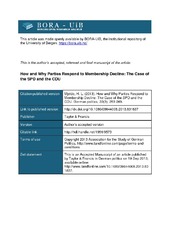How and Why Parties Respond to Membership Decline: The Case of the SPD and the CDU
Peer reviewed, Journal article
Accepted version
Permanent lenke
https://hdl.handle.net/1956/9573Utgivelsesdato
2013Metadata
Vis full innførselSamlinger
Originalversjon
https://doi.org/10.1080/09644008.2013.831837Sammendrag
A dominant assumption in the existing literature on party organisation in Western Europe holds that parties acquiesce in membership decline because modern campaigning is capital- rather than labour-intensive. This article studies eight reform attempts, from 1989 to 2011, by two paradigmatic member- ship parties, the German SPD and CDU. The examined party documents show that the two parties still value and seek mass membership. Indeed, most of the proposed reforms are not attempts at organisational innovation, but have the intention of consolidating the existing membership organisations. Surprisingly, the parties are concerned about membership decline not mainly for electoral reasons, but because they value and wish to preserve their legacy as membership organisations. Secondly, both the SPD and the CDU documents suggest that the legal-normative imperative of the German Basic Law requiring parties to sustain democratic linkage necessitates a membership organisation. Furthermore, the SPD views mass membership as inherent to social democratic ideology.
